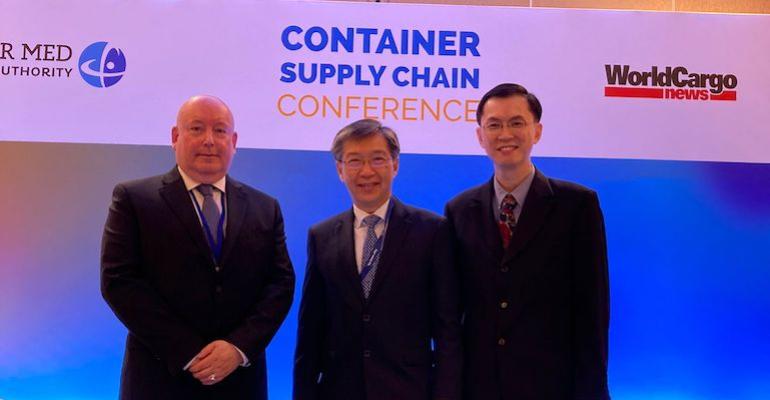Singapore-headquartered PSA already has a foundation comprising an impressive global network of ports that handle one in 10 of containers moved globally and now aims to link up parts of the supply chain from source to destination.
Speaking at the keynote session of TOC Asia in Singapore, Tan, explained: “We have spent 45 years building a portfolio of ports, but in the last 10 we’ve realised that was no longer adequate, but that in itself as a philosophy of our mission was no longer adequate and that technology has arrived, that we could connect, and we could think of our ports as a network. Now a network of ports doesn’t get us from end to end, so we’ve gone from ports to networked corridors and then from corridors we’re thinking solutions.”
He said that with the acquisition of US based logistics solutions provider BDP International, which was completed April this year, it now has complete suite to offer customers from source to destination.
Tan’s presentation went into considerable detail covering not just connectivity and transportation but also emissions targets, and the interdependency and trust required for these targets to be met.
Six global productions systems – food, construction, technology, automobiles, consumer goods and fashion were seen as accounting to 50% of emissions. “These six categories are very complex as production systems are global yet consumption is local, because it’s you, and so as result the world trade system is twisted in knots,” he said.
Supply chain considerations and eco-consumerism are set to come to the fore with many retailers setting emissions targets which they then ask their logistics providers to commit to.
For PSA itself its scope 1 and scope 2 emissions ratio will gear more towards to scope 2 over the next 10 years with scope 2 accounting for 60% of its emissions as it reduces its use of diesel and shifting to alternative energy sources. As such PSA will be very reliant on its energy providers are partners to give accurate and real-time information on the green index.
“We are all going to enter a world where we are mutually accountable, the mechanisms for mutual accountability do not exist yet in a comprehensive manner,” Tan said.
Seeing itself as gamechanger PSA has been developing a role across the whole supply chain.
“We have now restructured our business into two classes, one is ports and one cargo solutions. Within cargo solutions we make use of ports as a fundamental hard resource, we add facilities that we call port adjacencies, we are building customer adjacencies that are much more global than the portfolio of ports that we have and connect that digitally.”
As part of this PSA is developing corridors, an issue that was also touched on by fellow keynote speaker Kenneth Lim, Assistant Chief Executive (Transport and Industry) for the Maritime & Port Authority of Singapore (MPA). “Beyond the port it is really the corridors and connectivity to the rest of the world. Takes more than Singapore to connect to the global supply chain,” he said.
Turning to corridors PSA’s Tan said they were “hard to build". He talked about two different corridors one between Singapore and China, and another in Saudi Arabia connecting into PSA’s global network.
A southern trade corridor initiated between the Chinese and Singapore governments connects Singapore with the port of Qinzhou, China, inland to the city of Chongqing and through China rail express to Europe and the port of Duisburg.
“We are trying to use our imagination in the countries that we serve. We used to think we serve port and its immediate stakeholders, but now we think we serve country,” Tan explained.
Looking at Saudi Arabia PSA has been awarded the status of single operator in the port of Dammam and he said there was now another corridor being formed for domestic consumption requirements and also exports. “Then the control tower concept can now becomes a reality for Saudi Arabian companies to stage products before they even have a customer,” he said. If that customer is in China then the freight forwarding and documentation can be completely seamless.
Copyright © 2024. All rights reserved. Seatrade, a trading name of Informa Markets (UK) Limited.
Add Seatrade Maritime News to your Google News feed.  |

